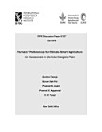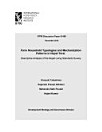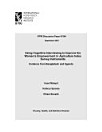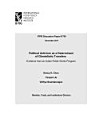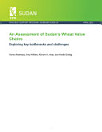Digital literacy training to promote diffusion of digital agricultural tools to smallholder farmers: Evidence from a randomized intervention in Egypt
Abdelaziz, Fatma · Abay, Kibrom A.
Sep 2025 · IFPRI Discussion Paper Book 2359 · Intl Food Policy Res Inst
Ebook
48
Pages
family_home
Eligible
info
reportRatings and reviews aren’t verified Learn More
About this ebook
Despite growing enthusiasm about the potential of digital innovations to transform agrifood systems, adoption among smallholder farmers in Africa remains low and heterogeneous. While the proliferation of digital tools targeting smallholder farmers is encouraging, the vast majority remain at pilot stages, facing important demand and supply-side barriers to adoption. This paper evaluates alternative digital literacy interventions designed to address these demand-side barriers. Following a Training of Trainers (TOT) model, we designed and implemented a randomized control trial to test three variants of digital literacy training: standard classroom-based digital literacy training (T1), digital training complemented (preceded) by a video-based play (T2), digital training complemented (preceded) by a live community play (T3), and a control group (C). We find that all variants of digital training significantly increased the uptake and utilization of digital tools by smallholder farmers. Specifically, the standard digital training alone increased uptake by 20 percentage points and utilization by 26 percentage points. The interventions also significantly enhanced farmer trust in digital tools by 8–13 percentage points. Surprisingly, for some outcomes, the digital literacy training alone outperformed the combined approaches that incorporated edutainment nudges. We explore possible explanations, including group size effects and social influence dynamics during the plays. We also document heterogeneity in the impact of these interventions across farmers’ gender and age. Our findings offer insights for designing cost effective and scalable interventions to build digital capabilities and trust among smallholder farmers.
Rate this ebook
Tell us what you think.
Reading information
Smartphones and tablets
Install the Google Play Books app for Android and iPad/iPhone. It syncs automatically with your account and allows you to read online or offline wherever you are.
Laptops and computers
You can listen to audiobooks purchased on Google Play using your computer's web browser.
eReaders and other devices
To read on e-ink devices like Kobo eReaders, you'll need to download a file and transfer it to your device. Follow the detailed Help Center instructions to transfer the files to supported eReaders.

